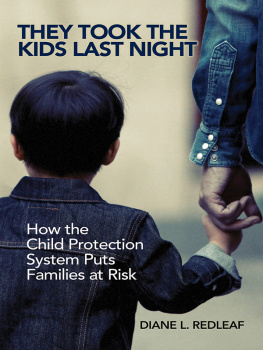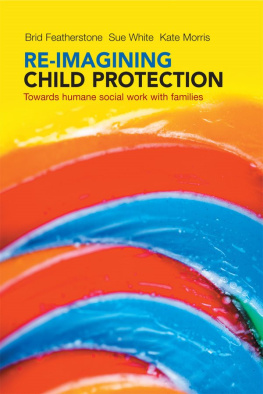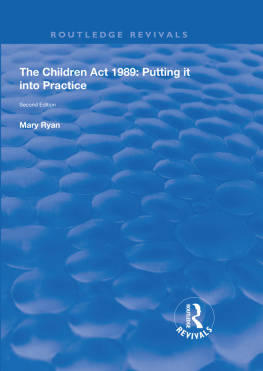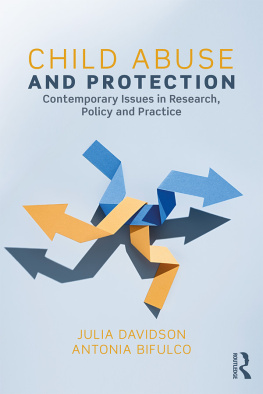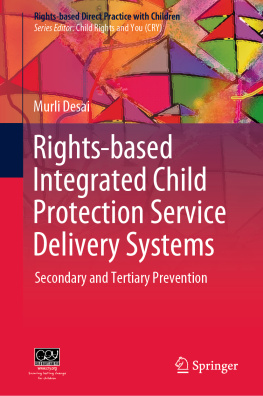First published in Great Britain in 2014 by
Policy Press University of Bristol 6th Floor Howard House Queens Avenue Clifton Bristol BS8 1SD UK Tel +44 (0)117 331 5020 Fax +44 (0)117 331 5367 e-mail
North American office: Policy Press c/o The University of Chicago Press 1427 East 60th Street Chicago, IL 60637, USA t: +1 773 702 7700 f: +1 773-702-9756 e:
Policy Press 2014
British Library Cataloguing in Publication Data
A catalogue record for this book is available from the British Library
Library of Congress Cataloging-in-Publication Data
A catalog record for this book has been requested
ISBN 978 1 44731 201 7 epub
ISBN 978 1 44731 202 4 Kindle
The right of Brid Featherstone, Sue White and Kate Morris to be identified as authors of this work has been asserted by them in accordance with the Copyright, Designs and Patents Act 1988.
All rights reserved: no part of this publication may be reproduced, stored in a retrieval system, or transmitted in any form or by any means, electronic, mechanical, photocopying, recording, or otherwise without the prior permission of Policy Press.
The statements and opinions contained within this publication are solely those of the authors and not of the University of Bristol or Policy Press. The University of Bristol and Policy Press disclaim responsibility for any injury to persons or property resulting from any material published in this publication.
Policy Press works to counter discrimination on grounds of gender, race, disability, age and sexuality.
Cover design by Andrew Corbett
Front cover: iStock
Readers Guide
This book has been optimised for PDA.
Tables may have been presented to accommodate this devices limitations.
Image presentation is limited by this devices limitations.
The authors would like to thank all those who have contributed to the development of the ideas explored in this book. While its final production is our responsibility, we have appreciated the opportunities to debate and discuss our thinking with many valued friends and colleagues. We would also like to thank our families, who have offered us support and, most importantly, the time to write this book.
One of the important ways in which the meanings of childrens lives may be constructed and become powerful is through the assumptions underpinning professional discourses, but such frameworks may reshape and arguably empty out the moral and political aspects of experience and suffering. (Ribbens McCarthy, 2013: 331)
Social workers are charged with entering the lives and moral worlds of families, many of whom have routinely experienced disrespect, and have longstanding histories of material and emotional deprivation. In entering such lives, social workers share with those they encounter universal experiences of loss and disappointment. However, there are additional issues that arise in the course of doing such a job involving the making of decisions that bring pain and hurt as well as joy and support with consequences that can endure for generations. This dual mandate (often known as care and control) is one to be treated with humility and seriousness.
Entering the homes and lives of those who routinely experience disrespect is a privilege but it is not a job for the fainthearted, especially in societies that are increasingly riven by hostility towards those who are vulnerable and in need. As the research evidence suggests, service users often feel fearful and powerless in their interactions with social workers, and this feeds into encounters that may be characterised by misunderstandings at best, and aggression at worst (Featherstone and Fraser, 2012a).
Increasingly, the work takes place in a very defensive climate and that defensiveness takes on particular forms from differing vantage points. Social workers have, for many decades, felt caught between a rock and a hard place, damned if they dont remove children and damned if they do. Their mandate is subject to fickle pendulum swings, with the terms usually set by others, from the government of the day to the media. It is perhaps not that surprising, therefore, that their self-perceptions are subject to the same volatile swings. In less frightening times, social workers seem more able to appreciate their power and service users relative powerlessness, whereas in very defensive periods, the focus seems to shift to social workers seeing themselves as powerless. Indeed, the narrative of victimisation has become a very powerful one, and unfortunately can obviate the need for the most rigorous interrogation of work that is so consequential. It can also preclude ownership by social workers of the substantial powers they possess.
Academics can be perceived by social workers as either persecutory or out of touch with reality in a risk dominated audit society. In such a context, it is understandable that the profession may shrink from critique, or for academics to feel their role is to make visible or celebrate the good work that is done. We do not shrink from critique in this book as we consider the consequences are too grave for workers, families and the wider society if we continue to pursue the child protection task as it is currently. However, we do want to emphasise that this book has been written in a spirit of solidarity with all those who undertake the task and those who teach and research in this area. We want to deepen and extend the dialogue and debate in which we are currently engaged with practice communities and policy makers.
We have written this book for many reasons, but a key impulse has emerged in the course of our engagement with managers, practitioners and students through research, speaking at conferences or tutoring. More and more often we encounter some disquiet about contemporary policy and practice, and, in particular, anxiety that the social justice aspect of social work is being lost in a child protection project that is characterised by a muscular authoritarianism towards multiply-deprived families.
However, we are also motivated by the concern we feel when we hear the phrase Im only here for the child. We understand that the phrase supports the performance of a moral identity in a confusing and frightening landscape where there are multiple vulnerabilities and risks. However, for all its rhetorical and moral potency, it reflects, in our view, misrecognition of childrens relational identities and we will argue that it is problematic ethically and practically.
We have also been influenced by our own research, and that of others, on service users perspectives. As Melton (2009) has argued, too often the current system objectifies the children whom it seeks to protect and the parents it accuses. Our research with parents suggests they are intimidated by child protection processes and feel fearful and powerless in their interactions with workers (Featherstone et al, 2011). Moreover, our research on system design supports the recognition from a range of international commentators of the systemic failure of the child protection systems that have developed in Anglophone countries. Lonne et al (2009) use the term Anglophone to refer to the following: US, Canada, UK, Australia and New Zealand. Although our specific focus is England, where we have been involved in practising, educating and researching for nearly three decades, it is abundantly clear that our concerns are shared more widely. Across countries, complex processes have developed that seem designed primarily to manage institutional risk (White et al, 2010) rather than to enable families to flourish within strong and supportive networks. We agree with those who argue that these processes are too costly, both economically and in human terms for all the stakeholders involved (Lonne et al, 2009).


